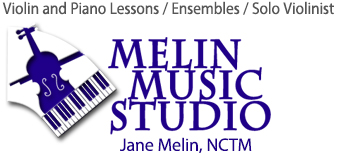About Melin Music Studio – Private Violin, Viola and Piano Lessons in Kitsap County, Washington
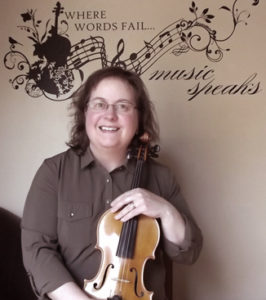 If you are new to my studio, welcome to lessons! Find out more about me on the Home page. I hope you will enjoy getting to know your instrument and making beautiful music with it. Please read through this page as it contains my studio policies and expectations. You’ll especially want to read The Lesson Environment, Compensation and Practicing.
If you are new to my studio, welcome to lessons! Find out more about me on the Home page. I hope you will enjoy getting to know your instrument and making beautiful music with it. Please read through this page as it contains my studio policies and expectations. You’ll especially want to read The Lesson Environment, Compensation and Practicing.
Looking for a violin, viola or piano teacher? This page should answer most of your initial questions. I am located in north Kitsap County within sight of the Kingston ferry dock. Please call me — 360-297-3495 — or send me an email through my contact form if you’d like to talk further.

Teaching Focus
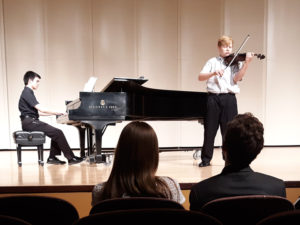
No teacher is the right match for every type of student. My teaching is geared towards students who want to make measurable progress through focused study, effective practice outside of lessons and high expectations of themselves. Another approach to music teaching could be called “recreational music lessons” for people who want to learn the rudiments of an instrument but not strive for proficiency above an intermediate level. If a student appears to have stopped making progress — demonstrating they are unable or unmotivated to advance technically and musically under my teaching methods — I will probably refer them to a different teacher whose approach is a better match to their learning style or objectives. The same is true for students who only want to work on their school or youth orchestra music. Also see Progress Expectations, below.
Some students are not interested in progressing through graded classical repertoire in the higher levels of violin/viola. I do not teach “alternative styles” (fiddle, pop, jazz etc.) above an intermediate level (Level 5 of my graded progression). Classical violin repertoire requires a wider variety of technical skills than most alternative-style music. I want to reserve my teaching time for students who seek to become proficient at a high technical level, to prepare for solo classical repertoire, chamber music or orchestral playing as a college student or adult.
Methods – Violin
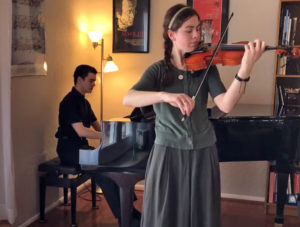 Ages 8 and up: I use standard classical repertoire, method books, scales and etude collections with my students, depending on their age and skill level. See my Bookstore page for the materials I use most frequently.
Ages 8 and up: I use standard classical repertoire, method books, scales and etude collections with my students, depending on their age and skill level. See my Bookstore page for the materials I use most frequently.
If students have an interest in non-classical musical styles (fiddle, pop/contemporary, improvisation etc.), I have been trained in teaching the Mark O’Connor Violin Method which draws on the 400-year-old history and traditions of America’s musical melting pot. This method provides an excellent foundation for all types of music for the violin. I do expect all students to play more classical selections by the time they reach Level 5 and above of my graded repertoire system.
For Young Beginners: Early mastery of music reading by my students is an important goal to me. Although I use the Suzuki violin and viola books (among others), I do not teach the traditional Suzuki method of learning-by-ear at first. Some students taught this way become so good at playing by ear that they find it difficult to learn to read music later. Instead, I have developed a unique curriculum with color-coded music notation and have taught preschoolers to read music with this method. Most 4- to 7-year-olds generally know their primary colors, numbers at least up to 5, and can probably recite the alphabet. Colors, numbers and letters are where these lessons begin, and building the 5-line music staff is where they lead. Most students are ready for standard music notation method books after just 12 to 16 weeks of lessons! Find out more here.
Methods – Piano
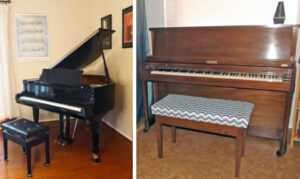 The studio pianos ~ a Baldwin upright piano for regular lessons, and a 5-foot baby grand with adjustable bench for performance prep
The studio pianos ~ a Baldwin upright piano for regular lessons, and a 5-foot baby grand with adjustable bench for performance prep
While piano is not my primary instrument, I can start beginners and take them to an intermediate level of most method series (about 2-4 years of study). Beyond that, I can provide recommendations to numerous upper-level piano teachers through the Kitsap Music Teachers Association.
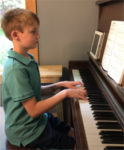 My goal for piano beginners is “functional literacy” on the keyboard, to pave the way for whatever level and type of musical expression they may choose to pursue. I mainly use the Piano Pronto series, for a variety of reasons. I heartily embrace iPad apps for rapidly learning to play the piano, both in lessons and for home practice. Music-reading, accurate playing and musical expression are important goals for all students, even the youngest.
My goal for piano beginners is “functional literacy” on the keyboard, to pave the way for whatever level and type of musical expression they may choose to pursue. I mainly use the Piano Pronto series, for a variety of reasons. I heartily embrace iPad apps for rapidly learning to play the piano, both in lessons and for home practice. Music-reading, accurate playing and musical expression are important goals for all students, even the youngest.
For very young students (ages 4-5) who might want to learn to play the violin but for whom the required fine-motor skills are a challenge, piano is a perfect instrument on which to start. I can also provide dual-instrument lessons to students who want to become proficient on both. And I enjoy coaching adult students towards self-sufficiency in reading and playing piano music so they can explore more on their own. I usually use Faber Adult Piano Adventures for this age group.
The Lesson Environment
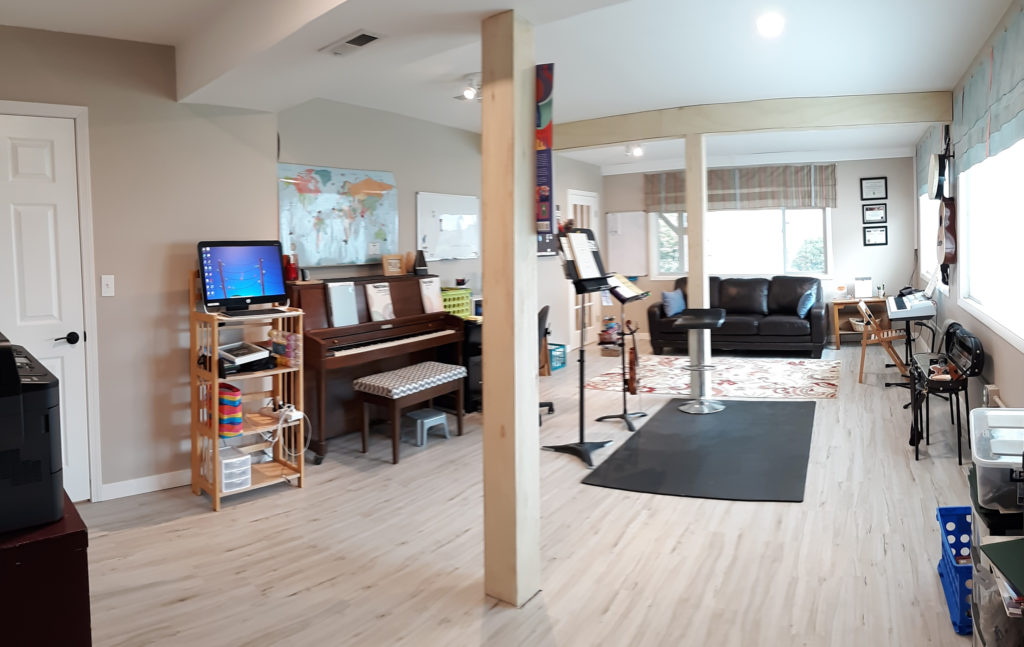 I give lessons from a large studio on the lower level of my home. Parents, caregivers and quiet siblings are always welcome to observe lessons, but no more than 3 guests can be accommodated.
I give lessons from a large studio on the lower level of my home. Parents, caregivers and quiet siblings are always welcome to observe lessons, but no more than 3 guests can be accommodated.
Studio Amenities: Guest WiFi access * Guest seating * Restroom * Studio piano (lower level) + grand piano (upper level) * Music lab with Yamaha keyboard and iPads * Sheet music library * Comfort mats for standing * Accompaniment instruments * Space for ensembles * Practice room * Video and audio recording equipment * Copier/printer * Notation software * Bluetooth speaker * Stand lighting * Mics, cameras and more for delivering online lessons
Please respect my home environment and students’ uninterrupted lesson times by~
1) Waiting for prior student(s) to exit before entering the teaching space;
2) Removing your shoes – bring slippers or socks, no bare feet please!;
3) Confining your access to my studio areas;
4) Bringing activities to quietly occupy any younger siblings who may need to be present during the lesson.
5) Refraining from outdoor play and phone conversations (I have neighbors);
6) Picking up your student promptly after their lesson.
During lessons:
1) Play when you are asked to play and don’t play when you are asked to stop or while your teacher is talking.
2) Actively listen to and absorb the teaching points given verbally. Your teacher cannot write down every teaching point verbatim in your lesson notes — you are expected to retain a certain amount based on the context of your music assignment.
3) Bring all lesson materials to every lesson.
4) Engage with your teacher during lessons — ask questions, demonstrate what you’re having problems with. Let your teacher know if you don’t understand an explanation or assignment.
5) Hellos, goodbyes, pleases and thank-yous are always appreciated!
Teacher-Student Contact: Learning to play an instrument is a physical activity and may occasionally require physical contact between teacher and student for coaching purposes in learning how to hold violin and bow, placement of fingers on fingerboard and keyboard, release of counterproductive tension etc. Physical touch is limited to arms, hands, fingers and sometimes shoulders. If students or parents have any concerns about the use of physical touch at lessons, please discuss with your teacher.
Attendance: Late arrivals will only be accommodated if there are more than 15 minutes remaining in the lesson block. If 15 minutes or less remain, the student will be turned away and the tuition is still payable. Try to schedule a makeup.
Repeated no-shows can add up to dismissal from the studio roster, especially if no advance notice is given. See below.
For weather interruptions, see Inclement Weather.
Practice Guidelines
Weekly lessons are times to learn something new, not practice what was assigned the previous week. Forming a regular habit of focused individual practice is key to progress. Students ages 6-8 are encouraged to practice at least 15 minutes per day, 5-6 days a week. Students in this age group will need parental assistance when they practice to follow the instructions in their notebook and maintain correct physical form and (violin) intonation; therefore parents of young beginning students should attend their lessons. (Any exceptions will be made on a case by case basis.) It is better for young students to practice less with more supervision than to practice a lot with none.
Older students should practice at least 30 minutes a day; by age 12 or 13 if rapid progress is desired then 45 minutes to an hour, minimum, is recommended. Advanced students wanting to continue to the highest levels of repertoire should set their sights on 2 hours a day. (For scientific proof of the importance of practice quantity, please read “10,000 Hours” on my blog.) Practice charts and reward incentives are provided for younger students up to the point that they continue to motivate diligent practice habits. Eventually the enjoyment of progressing to new ability levels should be the main motivator!
Provide a dedicated time and quiet space for your student to practice. It may be in the living room with TV and music turned off and siblings elsewhere; or in the student’s own bedroom with door closed. Students will need a music stand, metronome and tuner unless you have a keyboard to tune to; also a CD player or MP3 player for some method books; see above under Accessories. Piano students should be allowed to practice without any distractions in the piano room.
If significant assignments are not completed during the week (listening to new pieces; theory workbook or worksheets etc.), lesson time will be used for the student to complete these assignments on their own.
Progress Expectations
I do not want to waste your student’s time or mine. Each student will be given a minimum weekly practice time expectation. Students who consistently practice under their minimum time, or habitually do not complete weekly assignments to the best of their ability, may be placed on probation to determine if they are able to commit to the effort needed to make forward progress. Students who, in my and/or their parents’ opinion, are not exerting sufficient individual effort to benefit from the investment being made in their musical education, may be asked to withdraw from lessons in order to provide access to other deserving students. If the student could benefit from a different teaching approach or teacher personality, referrals will be willingly provided. [Also see Dismissals below.]
Compensation
A. Lesson Term Commitment
Students registering for lessons during the Academic Session (September to mid-June) are expected to continue to the end of the school year, and should plan to take at least 2-3 lessons during Summer Session (late June to August). Tuition and annual fees are calculated based on a September to August calendar (Academic Session + Summer Session). Summer lessons and practice are vital to keep skills from slipping when regular lessons resume the next fall. 30 days’ notice is required if students decide to stop taking lessons mid-year. Tuition is still payable during this time.
B. Flat Rate Tuition
Contact me for current lesson rates. Half-hour lessons are suitable for up to Level 3 (early intermediate) students, after which time a longer lesson is recommended for advanced technique instruction. Tuition for the full lesson year includes 37 to 38 lessons (depending on the calendar), and is payable in 10 equal monthly installments from September 1 to June 1 (Academic Session). Students starting mid-year will have the first month prorated.
Tuition includes one to two summer lessons to be used from mid-June to late August. When all 37/38 lessons have been taken, additional a la carte summer lessons can be individually scheduled.
C. Due Dates
Tuition is due by the first of the month for that month’s lessons. This is to assure lesson payments have been made prior to every lesson, in case of last-minute cancellations. A $15 late fee will be charged for lesson tuition not received by the 10th day of the month, regardless if any lessons have occurred by the 10th. Consider using your bank’s Bill Pay service to schedule automatic payments. Make payable to “Melin Music Studio” and use my P.O. box address for mailed checks.
D. Absences and Makeups
Tuition payment guarantees a continuing spot in my studio at your preferred lesson time. Only absences for student illness, family emergencies, mandatory school events (not including extracurricular activities), and pre-planned family trips are excused and eligible for makeup lessons, not refunds. Snow day lessons will be given online if there are no interruptions to internet service. Cancellations made by me will be made up at our mutual convenience, or added to the prepaid summer lessons up to a total of 3, or finally credited to a future month’s tuition.
Makeup lessons can be scheduled where there are openings during my regular teaching hours and must be taken within 4 weeks of the absence. This will probably take the form of 2 lessons in 1 week, or several extended-length lessons. Online lessons can be used for makeups or when a student doesn’t have a ride to their lesson. If a sibling is also taking lessons, they can use the absent student’s time too. If opportunities for makeup lessons are not taken, there are no tuition credits or refunds.
E. Dismissals
The following “3 strikes” payment and attendance issues are grounds for dismissal from the studio: Tuition not paid by the 3rd lesson date in a month; Missing 3 lessons in a row; No-notice, no-show for 3 lessons in the course of the lesson year; More than 3 late payments per year. Tuition for no-show lessons prior to formal notification of withdrawal is still payable. Students will be reinstated on a trial basis if outstanding tuition payments are made and new lesson tuition is prepaid before the first lesson of the month.
Other grounds for dismissal can include:
– Persistent absences or late arrivals
– Uncooperative attitude
– Failure to follow practice assignments as instructed
– Lack of progress due to insufficient practice or unfulfilled requirements
– Student or family members unable to comply with studio policies.
Other Fees:
1. The Annual Registration Fee (Studio Fee) covers participation in the WSMTA Music Literacy Program, MusiQuest Achievement Awards, use of the studio Music Lab (iPad + digital keyboard with headphones), and studio administrative expenses: supplies, equipment, teaching instrument maintenance, MTNA membership, prizes, recitals, etc. This fee is non-refundable. It may be prorated for students who start lessons mid-year.
2. The Technology Fee covers the personal subscription for piano students and interested strings students to Piano Maestro, the teaching and learning app that is integral to my piano methods. This subscription will be active until August 31 even if the student stops taking lessons mid-year. One subscription covers all the students within one family.
3. Music Purchased for Students: I will usually order music for the student unless there is enough lead time for the parent to do this themselves. Full retail price including shipping and tax (if any) plus $1 per book will be billed separately from your monthly tuition.
4. Event Registration Fees: If not included in the Studio Fee, participation fees for outside performance, recreation or competition events will be billed as incurred.
Since the majority of violin and viola performance pieces are arranged for piano accompaniment, students must have an accompanist for most performances. I am able to accompany most first-year students but beyond Level 2 the student must contract with an outside pianist. I can recommend and often make arrangements with selected accompanists but they will set their own fees. Typically the service fee for one rehearsal with accompanist plus the performance will be equal to the student’s usual single lesson fee, depending on the length and difficulty of the piece(s). Students are welcome to procure their own accompanist such as a friend or family member, as long as the pianist’s skill level is up to the demands of the music and they will not detract from the student’s performance.
Inclement Weather and *Online Lessons: If the North Kitsap School District closes due to weather conditions, lessons for that day or portion of the day will be conducted online, as long as internet service is not interrupted. You may still come to your lesson in person if you wish, but please call ahead to let me know. If NK schools are on a two-hour delay, then afternoon lessons will be held in-studio but morning lessons will be given online at your discretion. If you are traveling from another part of the county and your schools have a different weather response than the NK district, please call about any changes in your plans.
Lessons will be held in-studio during power outages as long as driving conditions are stable.
*Online lessons are provided via ZOOM. Contact me directly to get my ID and set up a time to connect.
Performance Opportunities
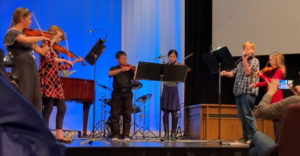 I arrange for performance opportunities for my students several times a year. I hold a full studio recital at the end of the academic year. Special performances such as multi-studio recitals, adjudications and the popular Music Carnival and WSMTA Musicianship Exams are also available to interested and prepared students through the Kitsap Music Teacher’s Association. Advanced students may also participate in the Seattle Young Artists Festival. I encourage students to join local youth or school orchestras for additional performance and ensemble experience. Check out the Kitsap Philharmonic, Bainbridge Island Youth Orchestra, or Kitsap Home School Strings.
I arrange for performance opportunities for my students several times a year. I hold a full studio recital at the end of the academic year. Special performances such as multi-studio recitals, adjudications and the popular Music Carnival and WSMTA Musicianship Exams are also available to interested and prepared students through the Kitsap Music Teacher’s Association. Advanced students may also participate in the Seattle Young Artists Festival. I encourage students to join local youth or school orchestras for additional performance and ensemble experience. Check out the Kitsap Philharmonic, Bainbridge Island Youth Orchestra, or Kitsap Home School Strings.
Incentive Programs
A variety of incentive programs are offered for student of all ages, from monthly practice prizes to Technique Tassels and MusiQUEST awards. More info here.
Especially for Homeschoolers
I am a listed Community Based Instructor (CBI) with the Quilcene and Orcas Island School Districts. For homeschooling families who enroll their students with one of these districts for teaching support and resources, music lessons can be funded by the district. The Quilcene District’s program is called PEARL, and Orcas’ program is called OASIS. Contact the districts for information on how these programs can help you afford music lessons at little or no cost to you!
Occasional Lessons…
Some students for financial or other reasons may wish to take lessons less often than weekly. This can be true for adult students also. If there is room in my schedule I try to accommodate irregular lessons, especially for adults, but NOT for beginners (2 years’ experience or less). I don’t recommend less-than-weekly lessons for students under 14, UNLESS they are also involved in a strings class or orchestra program where they are getting some instruction on violin technique.
Students on an irregular lesson schedule must be prepared to change their lesson time if a weekly student desires their time slot. Youth students on an irregular schedule are not eligible to participate in studio awards programs and probably will not be preparing for studio solo performance events. But, I can help students with their orchestra music and give additional technical help that they may not be able to get in a group class. Contact me if you want to explore these options.
